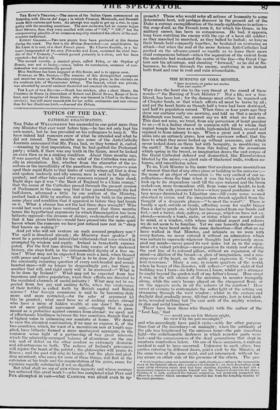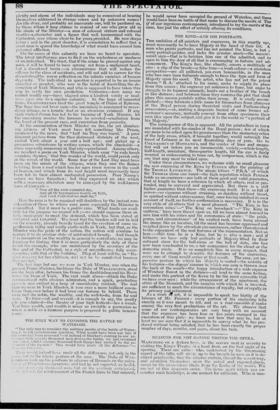THE BURNING OF YORK MINSTER.
" Quis desiderio sit pudor ant modus Tam cart capitis
'MIN. does the heart rise to the very throat at the sound of these words—" the Burning of York Minster ?" Not a life, nor a livelihood, has been lost ; for the damage must either be repaired out of Chapter funds, or that which affects all must be borne by all ; and yet the heart faints as though half a town had been destroyed, and half its population ruined. When three or four years ago they drew our curtains early one morning, and told us that a moiety of Edinburgh was burnt, we cannot say we felt what we feel now. This does not arise, we trust, from any perversion of heart peculiar to us ;—it is a feeling shared in common with all to whom that august temple has been as a noble, high-minded friend, revered and rejoiced in from infancy to age. When a great and a good man sinks into an untimely grave, how sadly survivors reflect, that the face to which they never looked up without reverence, and which never looked down on them but with benignity, is mouldering in the earth! Not far remote from this feeling are the sensations which spring in the breast, as imagination draws the vast corpse of the Great Cathedral defaced and dismantled, like Ehrenbreitzen blasted by the miner,—a giant ruin of blackened walls, roofless co lumns, and smouldering ashes. To us, York Minster is the name that awakens more associations of interest than that of any other place or building in the universe ; — the name of an object of veneration jit the very earliest of our recollections—from the time when it was the boy's awful delight to look up to its stupendous vault till the eyes watered and the brain reeled—or, more tremendous still, from some vast height, to look down on the wide pavement below—where-paced perchance a solibuy verger diminished to Liliputian size—till every sense scented absorbed in vision, and the imagination shrank appalled from the thought of a desperate plunge—" to meet the worst*." There is hardly a spot, outside or inside, affording room for aught bigger than a daw to perch on, which has been sacred from our hands and feet,—not a turret, stair, gallery, or passage, which we have not explored,--scarcely a tomb, niche, or statue which we cannot recall to mind, or a window, with whose individual aspect and colours we do not seem to be familiar. Yet we can honestly declare—and others we have heard make the same declaration—that often as we have walked in that Minster, and intimate as we were with every feature, we never entered it without an admiration which was certain to supersede whatever thoughts had previously occupied our minds—never paced its vast aisles but as in the enjoyment of a valued privilege—never gazed on its stately roof or along the vast line of its colossal pillars, without an expansion of the mind—a dilation of the breast—a glow of imagination, and a run ning-over of the heart, as the noble poet expresses it, "with si lent reverence." Many a one, in remote quarters of the world, when he hears of this disaster, will reflect—" within sight of that building was I born—its lofty towers I knew, whilst yet a stranger to aught beyond the garden-wall of my father's house. How sweet it was, in the still silence of the morning, to saunter tranquilly along, while the sun's beams played on the chequered floor, or on the opposite arch, in all the colours of the rainbow ! How sweet at evening to contemplate the softer light of the setting sun streaming through the west window ; whilst in the eastern end daylight died gradually away, till that extremity, lost in total darkness, revealed nothing but the vast arch of the mighty window, in dim and awful loneliness."
There have been those who thought with the author of the "Last Lay," that " — would you see fair Melrose aright, Go view it by the pale moonlight," and who accordingly have paid it visits—with far other purpose than that of the incendiary—at midnight; when the sublimity of the pile was heightened by the ominous hour—the pale uncertain light—the unfathomable darkness in which remoter parts were lost—and the consciousness of the dead generations that slept in numbers numberless below. On one of these occasions, a cmious incident is said to have occurred. Unknown to each other, two parties entering by different doors, paid a visit to the Minster, at the same hour of the same night, and got intermixed, without being aware on either side of the presence of the others. The per * Such impulses seem not unnatural in such situations ;—witness the memorable story of the Spanish officer, who confessed to Charles V., on their descending from some giddy elevation where they had been standing together, that he had felt a momentary impulse to precipitate himself and the Emperor down into the abyss. Charles' it is said, pardoned the Satanic suggestion, but prudently promoted the officer to a station which necessarily removed him from the tempting vicinity of the royal presence. plexity and alarm of the individuals may be conceived at hearing themselves addressed in strange voices and by unknown names ! An idle story, and probably an inaccurate one, will be pardoned us, by those whom it may chance to remind of one who grew old in the shade of the Minster—a man of colossal stature and colossal worth—a character and a figure that well harmonized with the Cathedral, over whose choir he for years presided. He now sleeps below ; and in the great disaster, it is consolation to reflect that a good man is spared the knowledge of what would have caused him poignant affliction. On the cause of this calamity we have no heart to speculate. The latest intelligence goes to fix it on the wickedness or madness of an individual. We trust, that if the crime be proved against any man, it will be found to have sprung not from a malignant heart, but a disordered brain ;—a circumstance that will reduce the offence to the class of accidents, and will not add to sorrow for the devastationfte worse reflection on the infinite varieties of human depravity. The individual in question is reported to be an insane preacher or prophet, who was in the habit of foretelling the destruction of York Minster, and who is supposed to have taken this way to verify his own prediction. Centuries—how many we cannot readily say—have elapsed since a kindred vanity or madmss gave rise to a similar calamity. In the hope of immortal fame, ERATOSTHENES fired the great temple of Diana at Ephesus. The hope has not been vain—the incendiary is consigned to neverdying infamy, as a lunatic fool or an atrocious criminal. If any such wicked dream has led to the burning of York Minster, let the incendiary receive the honours he coveted—exaltation from the hand of the present race, and execration from posterity. At the annunciation of their Minster on fire, the yet slumbering citizens of York must have felt something like Priam, awakened by the news, that "half his Troy was burnt." A poor Mellott poetess from the then distressed districts of the west, visited York about a year and a half ago ; and picked up a precarious subsistence by writing verses, which the charitable—a class unusually numerous in that city—purchased. Among others, we recollect a poem on York Minster, which sang "in rude harsh sounding rhymes," that this wonder of the world, could perish only in the wreck of the world. Some fear of the Last Day must have been on the minds of the citizens, when they saw the flames belching from a roof which has for ages risen serene in the vault of heaven, and which from its vast height must necessarily have been left to their almost undisputed possession_ Poor Nanny's verses we have forgotten ; but they expressed an idea which ‘vitit a necessary alteration may be conveyed by the well-known hues of COWLEY " Now all the wide extended sky,
And all th' harmonious worlds on high, And York Cathedral too shall die."
How the ruin is to be repaired will doubtless be the instant coneideratioa of those to whose care more especially the Minister is committed. But it must be a public care. -What funds are available for the purpose we cannot tell ;—we should suppose them uttetly inadequate to meet the demand, which has been stated at 00,0001. and 150,0001. We trust that the burden will not be laid oa the country, already heavily taxed for the erection of some superfluously bulky and costly castle-walls in York, but that, as the Minster was the pride of the nation, the nation will combine to restore it to its pristine state of unblemished beauty. And though it is incumbent on the wealthy in general to contribute, we may be ferei■ en for hinting that it is more particularly the duty of those 1.1 set the example, who are maintained by the revenues of the See and of the Cathedral, in a style of magnificence fully corre5 11(11114 with that of the building. They at least will be, as " Rit e nel for her children, and not to be comforted because ea, aye not." The last time but one we were in York Minster, was when the present Prime Minister, his Grace the Duke of WELLINGTON, stood on the I mimrlm altar, between his Grace the Archbishop and his Reverence he Dean of York. The vast vault above—which the Duke reconnoitered with obvious admiration, and a quick, penetrating eye—is now extinct in a heap of smouldering rubbish. The last iime we were in York Minster, it rose over a more brilliant assemLiaev than ever before it had been our fortune to behold. There Were met the noble, the wealthy, and the well-to-do, from far and Item To these—all and several—it is enough to say, the goodly pile you admired—the theatre of your high festival—lies a wreck. You have wealth, and wealth is never so enviable a possession as when a noble or a humane purpose is proposed to public benevoemce.



















 Previous page
Previous page